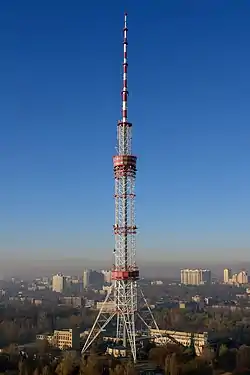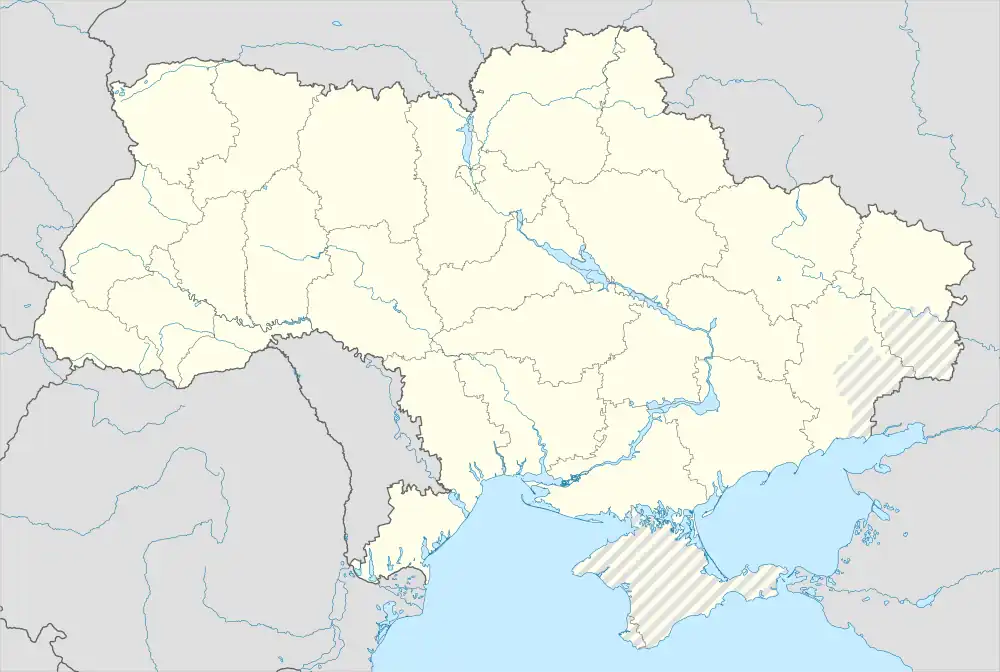| Kyiv Television Tower | |
|---|---|
Київська телевежа | |
 Kyiv TV Tower in 2014 | |
 | |
| General information | |
| Status | Completed |
| Type | Steel lattice television tower |
| Location | Kyiv, Ukraine |
| Coordinates | 50°28′16″N 30°27′12″E / 50.47111°N 30.45333°E |
| Construction started | 1968 |
| Completed | 1973 |
| Opening | 1973 |
| Height | 385 m (1,263 ft) |
| Technical details | |
| Lifts/elevators | 2 |
| Design and construction | |
| Architect(s) | Vitaly Szymanovsky |
The Kyiv TV Tower (Ukrainian: Телевізійна вежа, romanized: Televiziyna vezha) is a 385 m-high (1,263 ft) lattice metal tower[1] on Oranzhereina Street, Kyiv, Ukraine, and is the tallest structure in the country.[2] The tower was built in 1973 while Kyiv was the capital of Ukrainian SSR.[3] The tower was the tallest freestanding metal structure in the world[1][2] It is used for radio and television broadcasting and is not open to the public.[1] It is the tallest lattice tower in the world and sixth tallest structure in Europe.
History
The tower was first designed for Moscow, then the Soviet capital. But Moscow authorities preferred a more "solid" type of tower, which was eventually built (Ostankino Tower). Later, when Kyiv needed its own tower, the project was reintroduced. The Soviet government ordered the engineers to shorten the tower by almost 30%, so as not to be as tall as the Moscow one.[4][5]
Location
The tower was built on top of the Jewish cemetery in Lukianovka. The cemetery was officially closed in 1966 and Jewish families were given six months to rebury their relatives in the Jewish areas of a new cemetery in the city. Since the relatives of the interred had been killed in the Babi Yar massacre, most of the graves were not moved. After the headstones had been destroyed or removed, the antenna was built on top of the existing graves.[6][7][8][9]
Construction
Construction began in 1968[10] and finished in 1973[2] at a cost of approximately $12 million. Made of steel pipe of various diameters and thicknesses, the structure weighs 2,700 metric tons (2,700 long tons; 3,000 short tons). The central pipe, or core, where the elevator is located, is 4 meters (13 ft) in diameter and made of pipe that is 12 mm thick. It sits on a four-legged base that is about 100 meters (330 ft) meters tall. Atop the base is an enclosed level which houses microwave transmitting and receiving equipment. At about 200 meters (660 ft) is a second enclosed level that houses television and FM transmitters, as well as a control and maintenance shop. This second level is the elevator's terminus.
The tower is unique in that no mechanical fasteners such as rivets are used in the structure: every joint, pipe, and fixture is attached by welding. It is the first all-welded tower in the world.[2]
2022 missile strike
On 1 March 2022, the tower was hit by a missile fired by Russian forces during the Battle of Kyiv as part of the Russian invasion of Ukraine.[11] According to Ukrainian officials, five people were killed as a result.[12] The dead included Yevhenii Sakun, the first journalist killed in the Russian invasion of Ukraine.[13] Ukraine state advisor Anton Herashchenko accused the Russian army of trying to disrupt the city's communication infrastructure.[3] According to The Kyiv Independent, Ukrainian TV channels' broadcasting was disrupted following the attack.[14] It is unknown if the strike intended to topple the tower or if the intent was to disable its transmission and reception systems. The extent of the damage was not immediately apparent, and the tower remained standing.
The Ukrainian foreign ministry condemned the attack due to its proximity to the memorial to the Babi Yar massacres. The Babi Yar Holocaust Memorial Center confirmed reports that a second missile had hit the nearby memorial,[15] however there are contradicting reports.[16]
See also
References
- 1 2 3 "Kiev TV Tower". Emporis. Archived from the original on 1 March 2022. Retrieved 1 March 2022.
- 1 2 3 4 "Kiev TV Tower". SkyscraperPage. Retrieved 1 March 2022.
- 1 2 "Attack on Kyiv: TV Tower struck by missile as Russia warns residents to flee the capital". LBC. 1 March 2022. Retrieved 1 March 2022.
- ↑ В. Стах, "Викрадачі спокою наших осель", Україна Молода, #191, 14 October 2005 (in Ukrainian)
- ↑ І. Мащенко, "Гулівери земних споруд", Zerkalo Nedeli, #16 (340) 21–27 April 2001 (in Ukrainian) Archived 30 May 2012 at archive.today
- ↑ "Kiev Jewish Cemetery Reported Being Erased; Community Has No Rabbi". Jewish Telegraphic Agency. 25 April 1966. Retrieved 1 March 2022.
- ↑ "The Jewish cemetery in Kiev". centropa.org. Retrieved 1 March 2022.
- ↑ "Reconstitution of the historical memory of the Lukianivka Jewish Cemetery. | Бабин Яр". babynyar.gov.ua. Retrieved 2 March 2022.
- ↑ "Лукьяновское еврейское кладбище в Киеве – MEMORYON". memoryon.net (in Russian). Retrieved 2 March 2022.
- ↑ "Киевская телебашня стала приютом для соколов и стоит без единого болта" (in Ukrainian). Archived from the original on 19 March 2018. Retrieved 18 March 2018.
- ↑ "Deadly blasts at Kyiv TV tower disrupt broadcasts in Ukraine – video". The Guardian. 1 March 2022. ISSN 0261-3077. Retrieved 1 March 2022.
- ↑ "Ukraine says five people killed in Russian attack on Kyiv TV tower". Reuters. 1 March 2022. Retrieved 1 March 2022.
- ↑ Allsop, Jon (14 March 2022). "Brent Renaud, Yevhenii Sakun, and the grave dangers on the ground in Ukraine". Columbia Journalism Review. Retrieved 16 March 2022.
- ↑ "Russian attack hits Kyiv television tower, Ukrainian official says". Al Jazeera. 1 March 2022. Retrieved 1 March 2022.
- ↑ Gross, Judah Ari. "Russian bombing of Kyiv damages Babi Yar Holocaust memorial". www.timesofisrael.com. Retrieved 1 March 2022.
- ↑ Ben-Yishai, Ron (2 March 2022). "Babi Yar memorial said to be undamaged by Russian missile strike". Ynetnews.
External links
 Media related to Kyiv TV tower at Wikimedia Commons
Media related to Kyiv TV tower at Wikimedia Commons- Kyiv Television Tower at Structurae
- members.lycos.nl – Kyiv Central Radio TV Tower
- emporis.com – Kyiv TV Tower
- Russian Strike on the Kyiv TV tower. In: forensic-architecture.org, 10 June 2022 (with video).